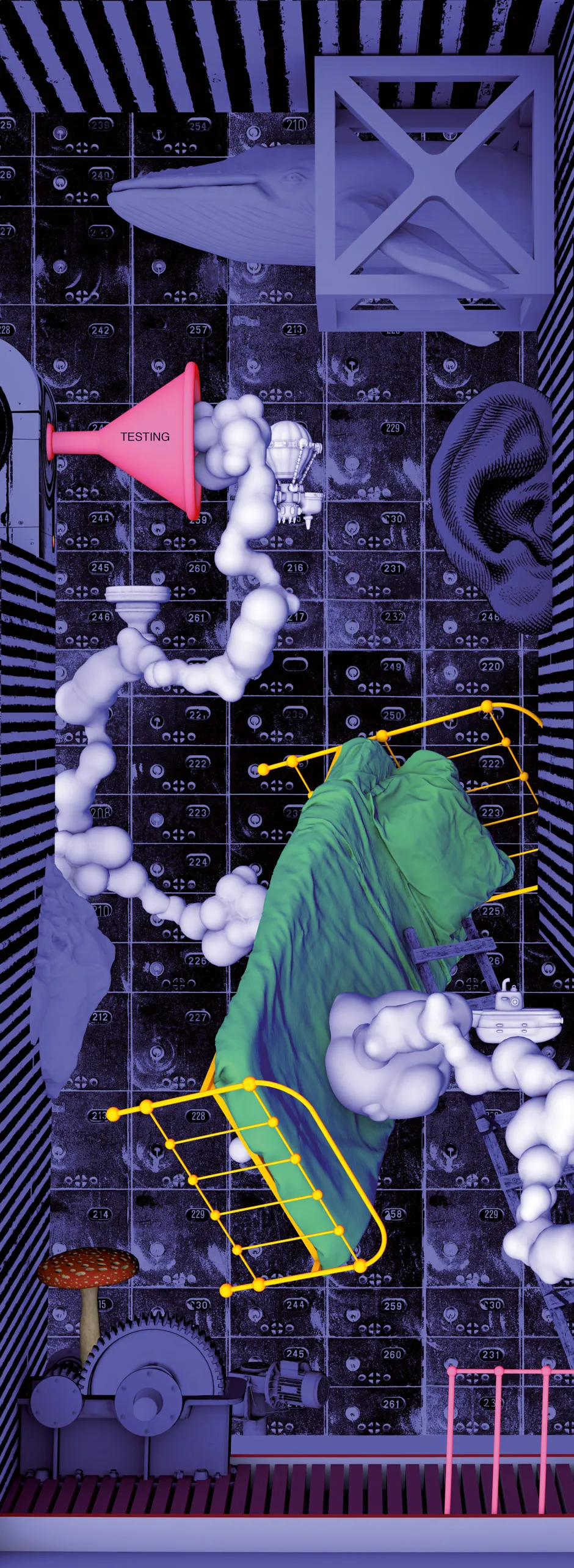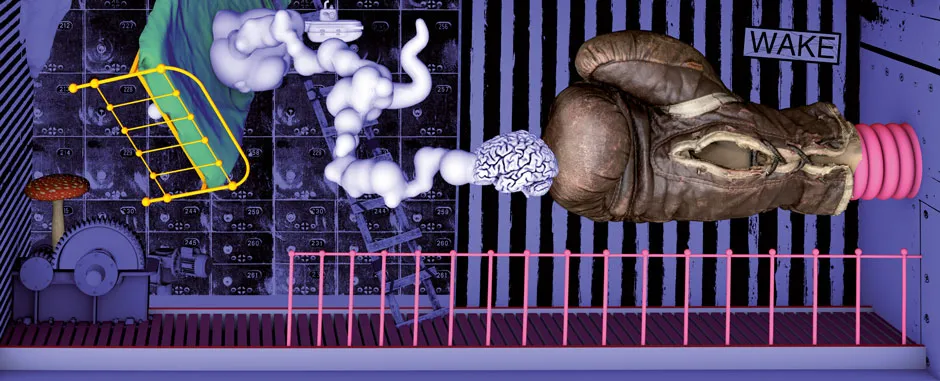How did sleep evolve?
Imagine two animals, of the same species, living in a dangerous environment where food is scarce.
Animal A spends the day searching for food and mates, while avoiding predators. When night falls, she rests, remaining still but watchful until daybreak. Animal B follows the same pattern, but while resting, she becomes unconscious, and almost entirely unaware of the world around her. Which animal do you think would have the best chance of survival?
If you answered A, congratulations! You have discovered the paradox that surrounds the evolution of sleep.
Debate rages over why all but the simplest of animals have evolved to spend so much of their lives unconscious. One idea is that sleep conserves energy, but studies have shown we burn almost as many calories snoozing as we do when we are awake, so that seems unlikely.
Read about sleep disorders:
Evolution tells us that if something is a risk, as sleep is, then there must be a benefit outweighing that risk. So what is the benefit that sleep brings?
Decades of research have linked sleep with memory processing, emotional stability and even the brain’s ‘rinse cycle’. But what we don’t know is whether we sleep because these processes need to happen, or whether we evolved to carry them out while sleeping because it’s more efficient than doing them during the day.
What’s clear is that the Earth has a rhythm, a cycle of light and dark, and almost all animals have their own circadian rhythms, or body clocks. Most set them based on light levels, but even blind cave fish in Mexico, which have lived underground for millennia, have body clocks.
Dr Andy Beale, a postdoctoral scientist at the University of Cambridge, studies these animals. He says that every cell in the body has a rhythm, so it is vital for organisms to have a way to sync these, even if they don’t use the Sun to do so.
So perhaps sleep arose as a way to group the body’s processes, ensuring that cells all carried out their maintenance simultaneously, rather than in conflict with one other.
Unfortunately, however, evolutionary theories are hard to prove, so for the moment we are left wondering how sleep emerged in the first place.
Why is sleep deprivation dangerous?
A handful of families appear cursed. Around middle age, many of the members develop strange symptoms: sweating, tremors and – most troublingly – complete and devastating insomnia. These are signs of an extremely rare disease called Fatal Familial Insomnia (FFI).
A genetic mutation in FFI sufferers causes misshapen proteins to build up in the brain, damaging the thalamus – the control switch between wake and sleep. Without this brain area, sleep is impossible. And without sleep, sufferers fall into a kind of waking coma. From the onset of their symptoms, they rarely live longer than a year.

While there are many theories about why we need sleep, how sleep deprivation can kill you is still a mystery. But a recent study may have found a clue.
Researchers discovered that cells in the brains of sleeping mice shrink, allowing cerebrospinal fluid – the colourless liquid that circulates in the brain and spinal cord – to flow more easily, sweeping away debris that builds up around active cells during the day.
This is carried to lymph glands and flushed out of the body. So perhaps sleep is vital because without it, these toxic by-products build up in the brain.
The idea that sleep cleans up our brains is hard to test, and studying people with FFI can’t give us all the answers. We can’t even know for sure if it’s the sleep deprivation itself, or the brain damage that causes it, that kills sufferers.
Animal studies provide another clue. Experiments have shown that sleep-deprived rats die within a month, but again, proving lack of sleep killed them is tricky – it could instead be the stress of being repeatedly woken.
The longest recorded period of wakefulness in a healthy human is 11 days, by student Randy Gardner. By the end, he suffered declining cognitive functions, mood swings and even hallucinations. Despite this, he recovered within a day or two, and didn’t experience any long-term health problems. But he might not have been fully awake for all 264 hours.
Read more about the effects of sleep deprivation:
- Sleep, drugs and mental health: how altered states of consciousness could keep us happy
- What happens in my body when I don't get enough sleep?
Research has shown that sleep-deprived humans experience ‘microsleeps’, of which they are unaware. These can last for just microseconds, and can even happen in one part of the brain while the person is ‘awake’ and functioning.
So can sleep deprivation kill a healthy person? Or will the brain fight back to protect itself? The answer is, we just don’t know…
Why do we dream?
Dreaming has fascinated scientists and philosophers for millennia, and still baffles us today. Originally, it was thought that dreaming only occurred during REM (rapid eye movement) sleep, and it does seem this is where most complex dreams happen.
But you can dream during other stages as well – these dreams tend to be more like snapshots, associated with strong emotions. But why do we do it?
One idea is that dreaming helps with sleep’s memory-processing function. After learning a maze, the brains of sleeping rats activate the same neurons they used during the day, as if they were practising or reliving the maze. We think the same happens in humans: in fact taking a nap, particularly if it includes REM sleep, can improve problem-solving abilities.
Learn more about what goes on in your brain at night in theScience Focus Podcast:
During sleep, our brains sort through information taken in during the day, decide what to store, and make connections between new facts and memories. It is possible that dreams help with this, which might explain why dreaming about recent experiences is common, but also why dreams often involve weird links that your waking brain would never make.
Another theory is that dreams help with emotional processing. When we first store a memory, the associated emotions are vivid, but over time they lessen.
This is why losses and traumas become more bearable with time (unless this process is disrupted, as in PTSD). Perhaps dreaming helps this dissociation, by allowing memories to be processed and removing some emotional associations.

Alternatively, dreams may provide a safe way of testing the brain’s reactions to negative or threatening events, which might be why dreams are often emotional. By practising running away from a dream monster, you know what to do if it happens in real life!
Or it might be sleep that is important, and dreams are just the by-product of a brain starved of external input – like a screensaver on your computer. Interestingly, some drugs suppress REM sleep, and patients report fewer dreams, but don’t seem to experience any negative effects… so the mystery of dreaming lives on.
Is being a night owl bad for your health?
Another mystery is why some people bounce out of bed at 7am, ready to face the day, while others repeatedly hit the snooze button before stumbling blearily towards the coffee pot.
This is the question being studied by Dr Sam Jones, a sleep researcher at the University of Exeter. By investigating the genetics and behaviour of around 700,000 people, he and his team discovered more than 300 genes that seem to play a role in making you a morning or evening person.
But your disposition isn’t set in stone. Previous research suggested only about 25 per cent of whether we are early-rising ‘larks’ or evening ‘owls’ is down to our genes.
Read more about your body clock:
“It looks like it’s predominantly habitual and environmental,” Jones says. “It’s not genetics that determines your ‘chronotype’ to a great extent, but your habits, your lifestyle, what you eat, how much stimulation you get in the evening, etc. It seems to be rather a modifiable thing.”
As well as understanding the chronotypes themselves, Jones investigates how they affect people’s lives, and early research provides tantalising hints. For example, evening people seem to be more likely to develop schizophrenia later in life.
And careful analysis shows this isn’t just down to genes having multiple effects – something about living the owl lifestyle puts you at greater risk of the illness. On average, owls also have lower wellbeing and are more likely to develop depression.
We don’t know for sure why this is, but Jones believes it probably isn’t being an owl itself that is damaging – it is trying to fit in to a society that’s set up for larks. This means owls are experiencing constant jet lag, which may put their bodies and brains under stress.
Because of this, some people are promoting the idea of a more flexible working day. But until further research is carried out, we don’t know whether this will actually improve the lives of owls, or make them less likely to suffer health problems.
Why do some people need less sleep?
We’ve all met them. People who do more in a day than seems humanly possible. When asked their secret they smugly say, “I only sleep for 4 hours a night – it’s all I need,” with a superior look on their face. But do they really only need half the sleep most of us do? Or are they storing up problems for later life?
In 2009, researchers led by Prof Ying-Hui Fu from the University of California, San Francisco, found that carriers of a particular gene slept for 2 hours less than non-carriers, on average.

But then they discovered a family with 3 generations of short sleepers who didn’t carry this gene. By sequencing their genomes, the team discovered another mutation that appeared to be linked with short sleep. And mice bred with this same genetic change were easier to wake.
These natural short sleepers don’t seem to suffer from the health problems normally associated with getting so little sleep.
But a note of caution here. The new study investigated a single family, and a team led by Jones has come across the same mutation but found no link to sleep length. Jones and his team are writing a paper to challenge Fu’s results, although Jones agrees that natural short sleepers do exist.
Read more about getting enough sleep:
- Michael Mosley: How much sleep do you really need?
- Sleep technology: 2019’s top gadgets to help you nod off
“It does look like some people might get away with less sleep, simply because of genetic factors which predispose to shorter or longer sleep,” he says. “I think there’s probably a limit, maybe somewhere between 6.5to 8 hours, but any more than that, I would be doubtful.”
Again, genetic factors are likely to play only a small role, and environment is vital too. It may be that short sleepers are actually efficient sleepers. Most people don’t spend all night in deep, restorative sleep.
Racing thoughts delay dropping off, or you might be awoken by noise, light or your bladder. Eating late or drinking alcohol before bed can reduce sleep quality, and staring at screens might have an impact too. Perhaps these people aren’t amazing in their ability to sleep less, but in their ability to sleep well.
This doesn’t make them any less worth studying, however. In fact, it might make them more important. We don’t know why some people fall asleep the moment their head hits the pillow, while others spend hours tossing and turning, or why some can sleep anywhere, anytime, while others need pitch-black perfection to get a moment’s shuteye.
Perhaps learning more about these short, efficient sleepers could help us all improve the quality of the sleep we get each night.
